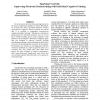Free Online Productivity Tools
i2Speak
i2Symbol
i2OCR
iTex2Img
iWeb2Print
iWeb2Shot
i2Type
iPdf2Split
iPdf2Merge
i2Bopomofo
i2Arabic
i2Style
i2Image
i2PDF
iLatex2Rtf
Sci2ools
114
Voted
HICSS
2012
IEEE
2012
IEEE
Sparking Creativity: Improving Electronic Brainstorming with Individual Cognitive Priming
In recent years, there has been growing interest in the study of individual cognition in teams. Meanwhile, we learned that much of human behavior involves nonconscious cognition. Recent research has shown that it is possible to manipulate nonconscious cognition through “priming.” Priming is a well-known phenomenon for individual behavior, but we do not know whether priming can be used to influence team behavior. We developed a Web-based computer game that was designed to improve creativity through supraliminal priming, a form of priming in which users are aware of the priming, but not aware of its purpose. Participants were exposed to a priming game and then worked as members of a team to generate ideas on a creativity task. Our results show that when users played the game designed to improve performance, their teams generated significantly more ideas that were of better quality than when they were exposed to neutral priming.
Based Computer | Biometrics | HICSS 2012 | Priming | Team Behavior |
| Added | 21 Apr 2012 |
| Updated | 21 Apr 2012 |
| Type | Journal |
| Year | 2012 |
| Where | HICSS |
| Authors | Alan R. Dennis, Randall K. Minas, Akshay Bhagwatwar |
Comments (0)

